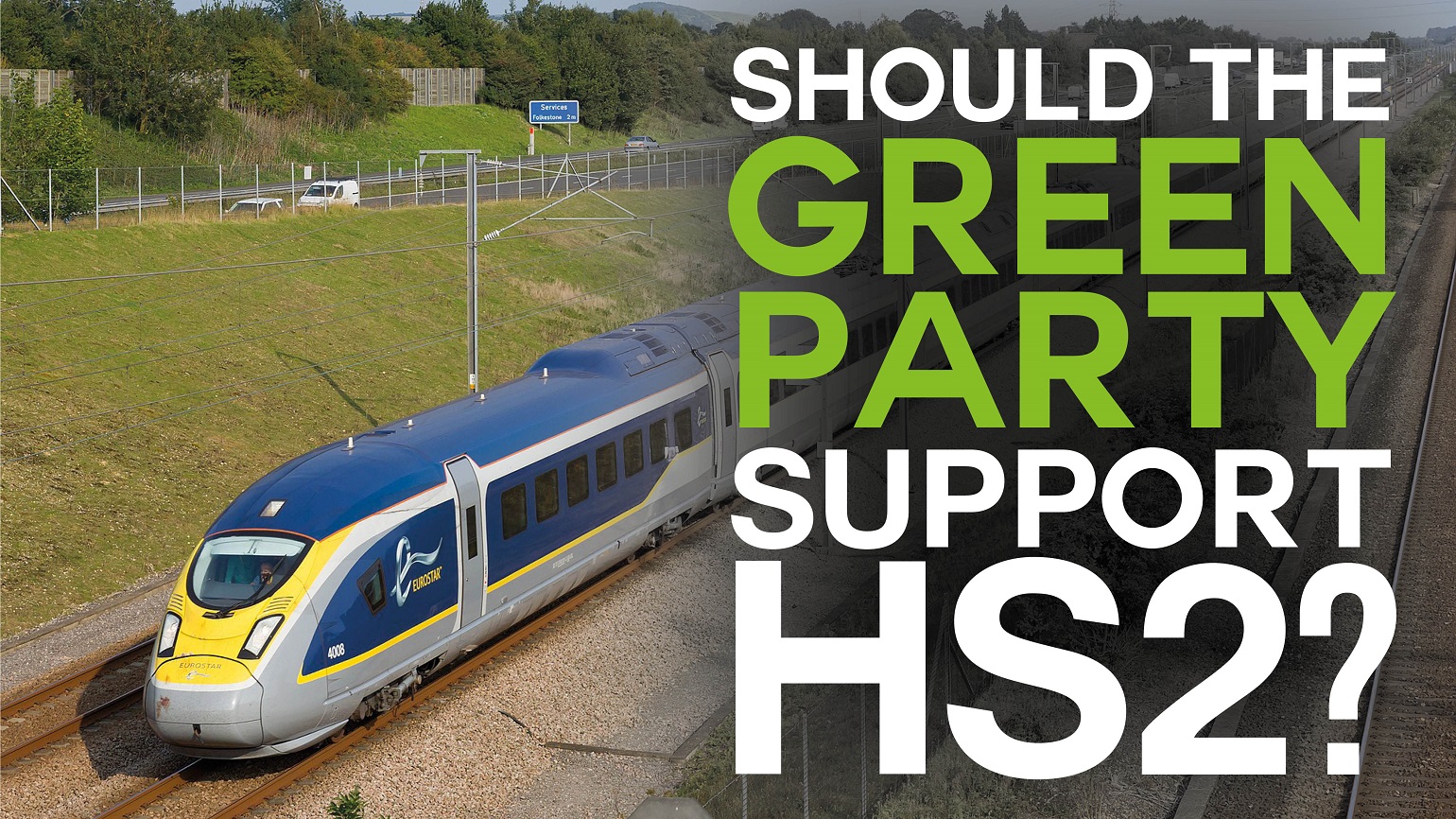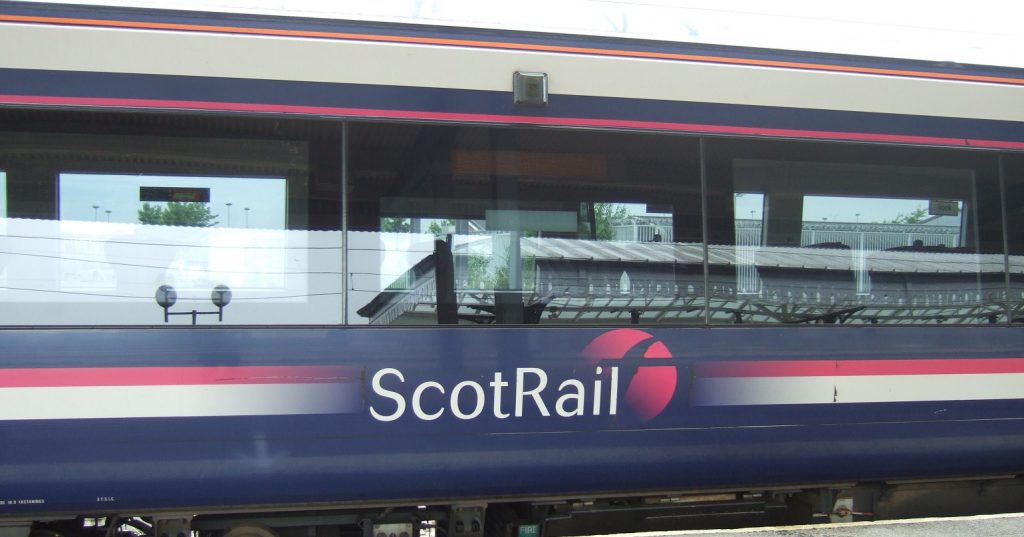Why Greens4HS2 want the Green Party to support HS2

At the Green Party’s 2023 spring conference, members will debate the party’s position on HS2.On the fourth episode of #BrightGreenLive, our editor Chris Jarvis interviewed Greens4HS2 members Emma Garnet and Pete Johnson. In the conversation, they discussed why Greens4HS2 are seeking to get the party’s support for HS2, the potential impact of HS2 on rail travel and whether environmental NGOs have got it wrong on the transport project.
Watch the full interview:
PS. We hope you enjoyed this article. Bright Green has got big plans for the future to publish many more articles like this. You can help make that happen. Please donate to Bright Green now donate to Bright Green now.
Image credit: Kabelleger / David Gubler – Creative Commons




It’s clear to me that we need to reduce the number of journeys made by road & domestic air travel if we are to combat climate change, toxic air pollution, road violence, traffic congestion, damage to human health from motor vehicles and reduce the demand for evermore new road building. Look at the road and air routes between our biggest cities – they are not exactly quiet. People need to travel. If we don’t want people to travel by those modes they need a viable alternative. Whilst a part of it, electric road vehicles aren’t the solution – they will still cause most of the previously mentioned negative impacts apart from climate change. Within cities, walking, cycling, buses and metro transit services are the key solutions. Beyond and between our towns & cities the most efficient way to move large numbers of people is by electric train – except just where we need more of them, there isn’t enough track capacity. Despite being sold on ‘speed’, the main reason for HS2 is to unlock capacity on the existing railway by separating fast intercity services from local and regional services – making space for more of the latter. Without more track capacity the railways can’t take the numbers of people we NEED to transfer from road and air. Yet, the head of Network Rail has said that we can’t upgrade the existing railways to achieve that without upto 30 years of rail replacement buses every weekend – which clearly isn’t viable if we are trying to encourage people onto the railway and fight climate change! This is why HS2 is essential, in my view as a pragmatic Green Party member and campaigner…
There is no freed up space created by HS2! Even on the proposed timetable of HS2 Ltd themselves only one extra service/pathway is created. If you believe that there is a “step-change in capacity” – as in creating more train paths for local services – then you need to spell this out but think you’ll be on your own on this. Again as HS2 Ltd admits it creates more CO2 than it saves even if its run over a 120 year life cycle. Think events are overtaking you in any case. Looking increasingly like it will struggle to the edge of Birmingham & Birmingham Airport from the edge of London and then not go any further – and all this for what?
Greens 4 HS2 fail to understand HS2 supports more air travel encourages expansion of airports. HS2 are building lots of carpark spaces for HS2 users. The whole point of it is to boost growth on a business as usual model.
We need to reduce our impact on the environment. HS2 is a really bad example of reducing our impact, today or tomorrow.
Email Garnet hits it bang on the head time and time again. I cannot support the Green Party because of their attitude to new electric railways. If Emma was the leader I’d change my support.
The link roads to the Lower Thames crossings destroy 35 times as much ancient woodland per Km than HS2. It’s short distance destroys two -thirds of that affected by HS2 over it’s massive length.
We need to get modal shift from road and air to rail. HS2 will do this, alternatives will do the opposite.
We should travel less: Well how do you do this in practice? On price so only the richcan travel? By ration so grandparents are restricted from visiting family? I’ll leave the Green Party to sell that to the electorate.
I’ve literally done a double take, did Emma Garnett really say we should never have heard of HS2 unless we live near it? If nothing else, this is a project that will cost billions of taxpayers money and the cost keeps increasing. Of course we should have heard of it! The shame of it is most people had never heard of it until the last few years and that is down to the hard work of a group of extraordinarily committed people bringing it to public attention.
I listened to this interview with interest. Pete and Emma make a lot of good points. They’ve given me a lot to think about as someone who abhors environmental destruction. I remain sceptical about the benefits of HS2, but am open to persuasion. Here’s a few observations to further the debate:
A growing body of research, highlighted in books like George Monbiot’s ‘Regenesis’ and Peter Wollebien’s ‘Hidden Life of Trees’ suggests that the impact on biodiversity of big infrastructure projects is far more damaging than previously estimated. Emma talked about regeneration and holding HS2 Limited to account regarding its commitments to net zero and mitigating biodiversity loss, but the impact of regeneration and carbon offsetting is depressingly inadequate when weighed against simply preserving those habitats in the first place. Taking Ancient Woodland alone, it really does take hundreds of years for such habitats to come to maturity. The same goes for wetlands and meadows.
I take the point about most of the damage being already done, but what would be the additional ecological damage estimated for the Birmingham to Leeds segment of the project if it were to be built? Also, what message does this send about future projects, whether road, rail, housing or industry? If the Green Party started supporting HS2 in its entirety, would there then be an accompanying statement of ‘So far and no further’? or would the gates be opened for further new rail building? One would surely hope not.
What would be the relative environmental costs of improving existing rail links to remove these bottlenecks that Pete mentioned? Has this even been studied?
I guess the existing HS2 project will go ahead and, once complete, Greens will have to say the damage is done, now use the service to maximise the gains in carbon emission reduction. So, in practice, this may be more about maximising the political gains and making sure we don’t simply become a naysayers collective. Let’s face it, there will be a Labour Government in power in 2 years’ time, and if they’re committed to completing HS2 in full then it’s a question of when the Green Party starts actively saying, use the service (as suggested above).
Hi Tom, Emma here.
Thank you for watching and your thoughtful questions!
I also abhor environmental destruction – it’s one of the reasons I support more railway lines, as cars and roads cause much more environmental destruction per passenger km – in terms of pollution, energy use, climate change, land footprint and loss of wild habitats, road kill. The list goes on!
I agree – many ecosystems can take a long time to recover, and I would never claim mitigation measures are perfect. I would strongly disagree with anyone suggesting “it’s ok we’re building this coal mine/road, because of the mitigation measures we’re putting in place.”
I take your point about future projects. Projects such as coal mines are always worth campaigning against because of their on-going ecological damage from burning coal. However, it wouldn’t make any sense to close down an operational electric railway because using it (rather than alternatives) is a win for the environment.
For the Birmingham to Leeds leg there would be some additional woodland loss. This should be minimised and mitigated as far as possible. However, without the eastern leg, HS2 would just relieve congestion on one mainline (west coast mainline) instead of three. So that would massively slash the benefits of the project whilst only avoiding a small amount of the ecological costs of building HS2. Let alone the ongoing ecological damage from road use that could be reduced from more rail capacity!
I think we do need to build more railways – we have a fraction of the track length that we had in the between 1900 and 1960. https://twitter.com/eegarnett89/status/1575792251812257792?s=20
This is an important point that gets overlooked: building HS2 DOES improve the existing railway. “To achieve this step-change in capacity without HS2, you’d need to add two extra tracks to each of the three mainlines coming out of London right up to Manchester and Leeds, as well as rebuilding junctions and stations.” More info in this thread. https://twitter.com/PermanentRail/status/1095442768791564288?s=20
If like me you like visuals to help understand an issue – here’s a presentation and panel discussion that I and other Greens4HS2 did. https://youtu.be/dJDPyXePAYE?t=358
I co-sign the entirety of your last paragraph!
On “improving existing rail links to remove these bottlenecks” it’s important to listen to the people who run the existing railway and know how complicated such upgrades are whilst maintaining operations. Many of us remember the West Coast Upgrade which caused disruption for many years and the benefit was only briefly felt before the capacity was maxxed out again due to restrictions on what they could achieve with that. Then there was the Thameslink Upgrade that almost lead to riots at London Bridge station due to the disruption to services.
The boss of Network Rail has previously said that upgrading the existing network to achieve the same capacity release that HS2 does is just nor viable – it could mean up to 30 years of rail replacement buses!
https://www.newcivilengineer.com/latest/scrapping-hs2-will-lead-to-30-years-of-delays-network-rail-chief-warns-30-01-2020/